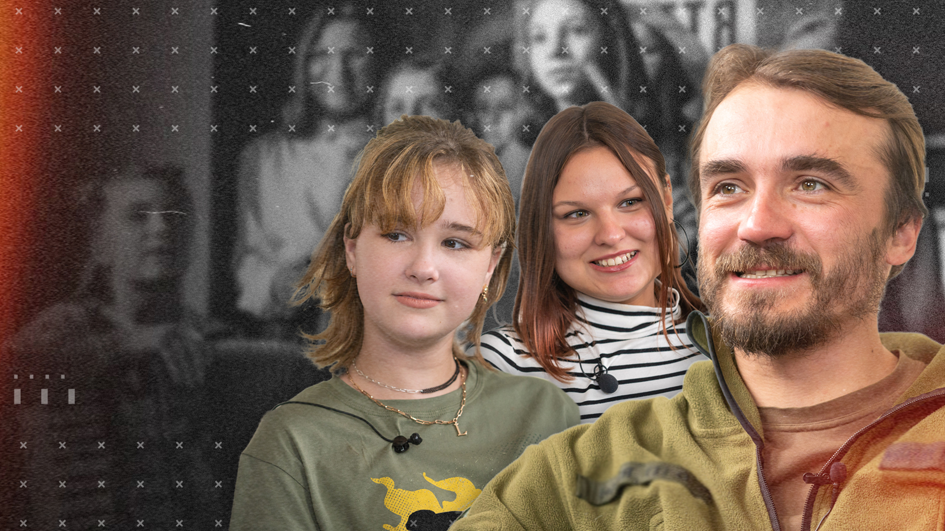
[For urgent updates please follow Ukrainian Freedom News on Telegram]
During his visit to Lviv, the Minister of Defense thanked the representatives of «!FESTrepublic» for their work. As we know, they came up with the «Buy me a fighter jet» initiative and accompanied it. You also contributed to it by collecting a million hryvnias ($30 000). Tell us how it all started, what is the history of the play and this project?
Marho Kuzma: Mr Oleh gave us the text of the play – and not everyone immediately liked it [«Mom on Skype» is a play based on the book of the «Staryi Lev» Publishing House in 2013, which collected under one cover the stories of 12 writers about labour migration and its impact on families].
I think I was the only one who liked it right away, because it evoked associations with certain moments of my own life. I immediately remembered the time with my sister in the village, how we ran across the field. And then, we wanted strawberries, but it was needed to go too far to get them. We were lazy, so we just lay in the grass and it was really cool. These are very pleasant memories, so, I repeat, the play touched me from the very beginning.
Oleh Oneschak: We started working on the play about a year ago. In general, this is an ancient story. I have been involved in the theatre studio for more than ten years. I read the book «Mom on Skype» a long time ago and immediately fell in love with it. I thought it would be cool to put on a play after it, because this book is a semi-documentary, and the subject is like that!
In fact, I never treated my pupils as children – rather as adults. But at that time, they were still too young to touch on these topics. When they grew up, I decided that it was time to start «Mom on Skype». In this edition, even the pages have turned yellow from time.
To tell the truth, at first, the children didn’t really «get it», because these stories are not funand mostly end quite tragically. Not all moments were included in the production because I tried to choose brighter ones from the book, in which there is still hope. I wanted to work with topics that affect not only our actors and their parents but also to reach a wider audience with them. And this performance is just like that.
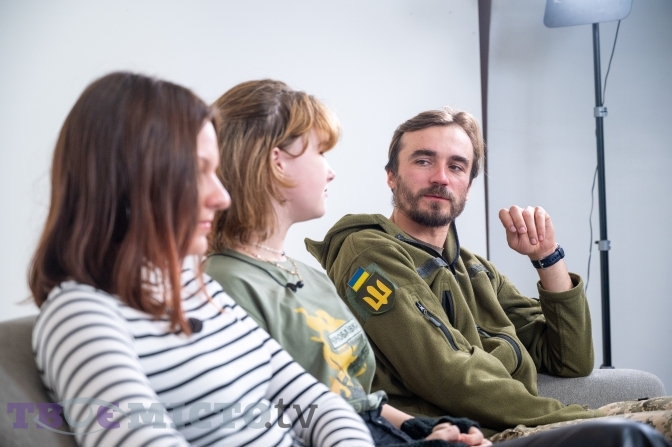
Recently, I was offered to organize a screening in Lviv, to call mothers with children. But this is not an option, because in this play, the child actors are addressing adults, so the children in the audience will be bored, uninterested, and may not understand anything.
How did you resume rehearsals after the full-scale invasion? After all, the first performance of the play took place during the war. How did you manage to organize yourself under such conditions?
Oleh Oneschak: Actually, it was the idea of Yurko Nazaruk, the co-founder of «!FEST». We gathered at a meeting, and he suggested: «While you are on official business in Lviv, do a play with the children at our shelter.» It was March, and then it seemed not a time for performances at all. I went to military service and didn’t focus on which of the children left and which stayed. Seven of the involved girls were in Lviv, Marho also returned from Poland a bit later, but Marta and Anna-Maria are still abroad.
The children could be given texts to learn quickly, and we would start putting on a play and raising money for the army. When we first gathered at the shelter, I realized that this was a very good idea. At least, it seemed to me that it was important for the children to meet. There was a certain feeling of inner peace from the fact that they were smiling and happy. Someone even said: «Thank you, Mr Oleh, for pulling me out of the house, because I was already sitting there. And now there is war, trouble and the feeling that «we will all die.»
Read also: The first cinemas in Lviv and movies of the interwar period. From the city’s history
Did your parents let you go easily?
Khrystyna Hniedko: At first, I didn’t want to play there at all because I had to get to «!FEST» location over an hour. But I still came to the rehearsal, played, said my words – and I liked it so much that I decided: I don’t know how, but I will go there. My parents, of course, let me go, they support all my endeavours.
We rehearsed in the bomb shelter of «!Fest Republic», played one show – and then were immediately invited to America! This is probably the fastest career growth of actors in the whole of Lviv, at least I haven’t heard of this yet (Laughs).
Marho Kuzma: I was in Poland at that time. My mother and I were going to return from Warsaw, because we missed home so bad. And here, another reason appeared, so we immediately returned. I was very happy to see everyone. At the rehearsals, it didn’t feel like we were in a bomb shelter, because my friends were there. Even during the rehearsal, I forgot where we were and why we needed this room.
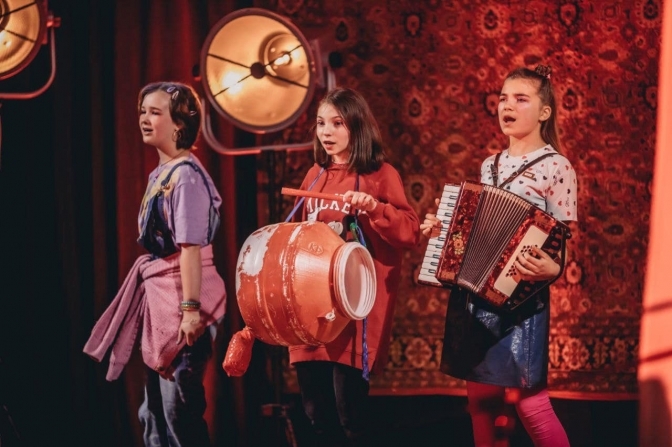
A trip to America
Then you began an incredible rise. How did you find out about the invitation to the USA and how did you go there?
Khrystyna Hniedko: At first, journalists from The New York Times wrote about us. Then we got noticed by Terry Greiss, director of the Irondale Ensemble Project theatre in Brooklyn. He messaged Mr Oleh that he was inviting us on tour sponsoring everything.
Mr Oleh wrote to us in the group: «We are invited to Brooklyn, in the USA. But it’s not yet known how everything will turn out, because we need visas and other requirements.» When I read it, at first I was shocked, and then I thought: «No, is this in America? I don’t think we will succeed.» And I thought so until the very end, until I received a visa. Then we went to get our visas in Lublin, Poland with another girl who was already 14 years old. At first, they didn’t give them to us, and we were already scared. We stayed in Lublin without parents for another week and finally received American visas for 10 years. We were happy!
Marho Kuzma: I was also happy. Because visas were almost never issued at that time, and we were given another 10 years in such a short term!
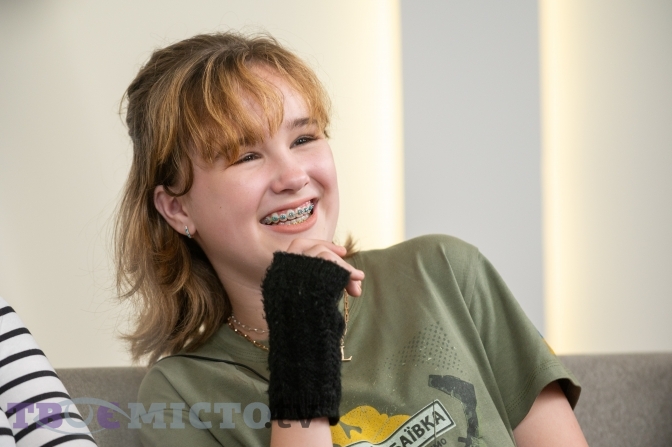
It’s worth clarifying that Mr Oleg could not accompaign you.
Khrystyna Hniedko: Yes, Mr Oleh is in military service, he could not join. So his wife, Ms Maria, went with us.
How long were you in the USA, in which cities did you perform?
Khrystyna Hniedko: Exactly one month. We were in New York and its districts – Brooklyn, Manhattan, Yonkers, in Connecticut, namely in Hartford and Deep River, Boston, Philadelphia. The most memorable performance was in Brooklyn, at the Irondale Ensemble Project theatre. It was our best performance, we improvised a lot there, played with the audience, felt it «alive», and that made our performance beautiful.
You were there alone, without your parents, right?
Khrystyna Hniedko: Yes, only Hannusya and Lesyk – Mr Oleh’s children – came with their mother.
Marho Kuzma: And Nastya, another girl, was with her mother.
The play you are playing has turned into real life – you have been away from your family. What did you feel?
Khrystyna Hniedko: It so happened that we, the children, went to earn money via Skype, not our moms (Laughs). I missed home and my parents. But this is not the first time we haven’t seen each other for a long time.
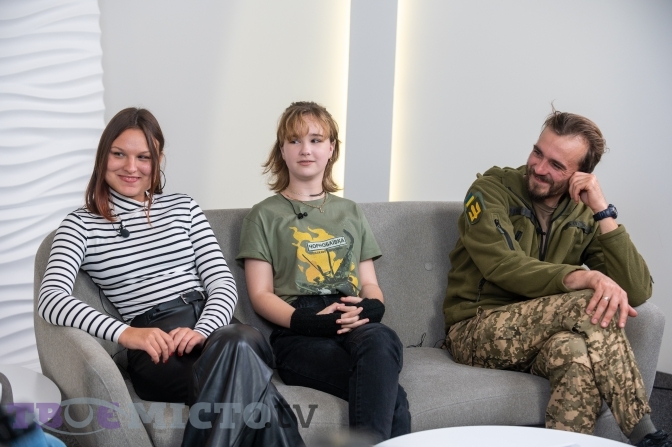
Marho Kuzma: It was my first time, and I felt free that I could eat junk food at McDonald’s before my mother saw it, and I bought me a jelly (Laughs).
Now, for a serious question: the performance was accompanied by fundraising for a combat aircraft for Ukraine. Did you talk about it with the audience, with the people you visited? Maybe they asked you something?
Marho Kuzma: Yes, a lot. In Brooklyn, we lived with a very hospitable older couple. I remember how we went grocery shopping together and were always asked: «What would you like to eat?» We behaved modestly, and said: «If you can, then this would be good.» And they bought us two types of ice cream.
Oleh Oneschak: I would like to add that this project in the States was exclusively voluntary. Mostly, artists who go on such tours give approximately 30 per cent of what they earned on them. And in our country, no one received fees at all, not even three adults who accompanied the group. We also agreed that they would not spend money on travel and food.
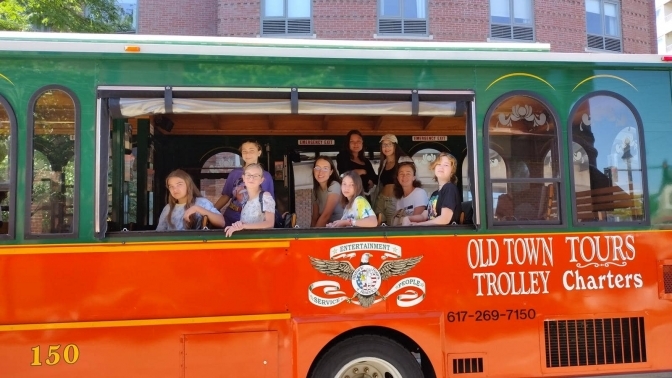
The theatre received and accommodated the participants of our studio in American families and sometimes in hostels and hotels. The Ukrainian diaspora also helped with the settlement. Thank you once again for this, because it is very cool that they responded, took care of the children, took care so that our artists would remember something interesting, so that it was not just a tour, but also an excursion!
One lady, Lyuba, wrote to me: «Oleh, I can’t organize a performance – it’s a weekday, people won’t gather. Besides, it’s summer, everyone’s leaving. But I really want to do something for children.» And here’s what she came up with: since her future suitor is the chief sheriff of the National Park in New York, he promised to take our group to the island where the Statue of Liberty stands and give us a tour for free. And she organized this trip for us!
We received many different offers, for example, that there is a room that costs $800 to rent. This is the minimum that tenants can offer. I answered: «We are going with a slightly different purpose, not to make money. We will not sell tickets.» We asked to base on spending less and collecting more.
By the way, we talked about the combat plane only among themselves and with representatives of the diaspora or Americans connected to the organization. They asked not to announce this to others, because they have partially forbidden fundraising for weapons, and here, moreover, children are doing it. The organiser advised us to say that we are simply collecting for the army, for aid, not to specify for what exactly, but to use the collected at our own discretion.
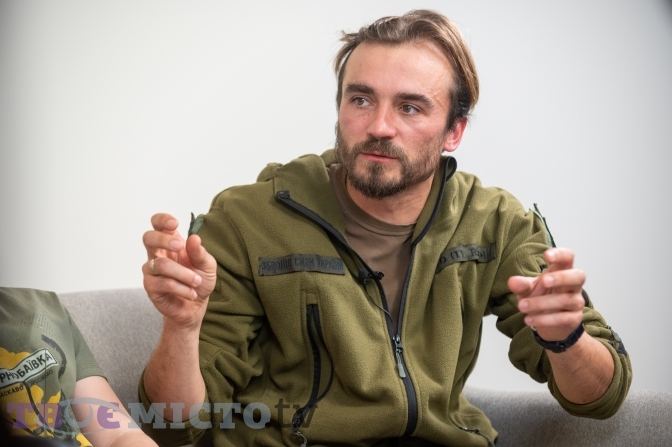
We made QR codes, wanted to put a banner, and ended up folding it all. In fact, it’s different from state to state, even though we’ve written a nice piece about how this plane won’t kill others, it’ll protect us.
What were you most asked about, wished for in the USA?
Khrystyna Hniedko: Most people asked about the situation in Ukraine. Of course, they wished for peace.
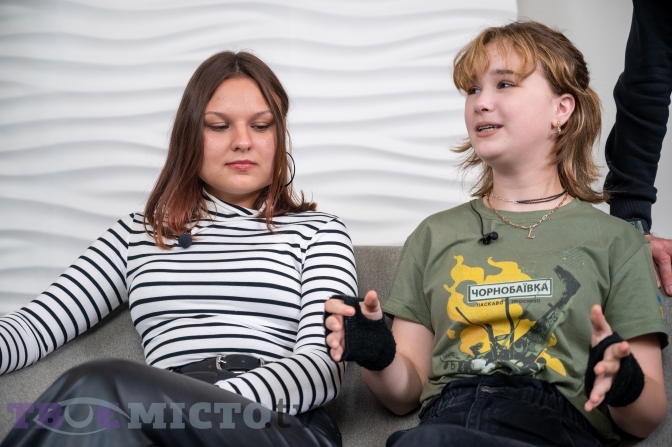
About the Russian culture
You’ve grown up during this time. One of the biggest discussions now concerns the exclusion of Russian culture from our usage and explaining to the foreigners why this should be done. How do you see it?
Khrystyna Hniedko: I believe that now, it is very necessary to exclude everything Russian from our lives. Over all these centuries, we have been heavily Russified, especially the east of Ukraine. There, Ukrainians were forced to believe that they were Little Russians. Now, during the war, it is absolutely necessary to separate our culture from theirs, to make sure that their culture does not reach us. Because for some reason, you go to the selection of the most popular songs on Spotify, and there are still Russian songs in the list of what Ukrainians listen to! And you immediately think – why? Well, why are our citizens so ignorant? Do they not understand that when you listen to a song, the money goes to the artist or his label?
Marho Kuzma: These people sponsor the war!
Khrystyna Hniedko: Even if artists do not invest the money earned in this way into the war, they still pay taxes, which are used to finance it.
Marho Kuzma: I often came across videos on TikTok in which Ukrainian women, who sing very beautifully, translate Russian songs. I don’t understand: do they have nothing to do at all?
It works on a semi-conscious level: you listen, read something Russian, adopt the thoughts of Russians and, accordingly, perceive them as no shame.
Khrystyna Hniedko: And when people say: «It doesn’t matter that language do you speak», they blur the boundaries between Ukrainians and Russians. You see for yourself what happened in Belarus: they have their own language, but at the same time 90 per cent of citizens speak Russian, even the president. This simply should not happen!
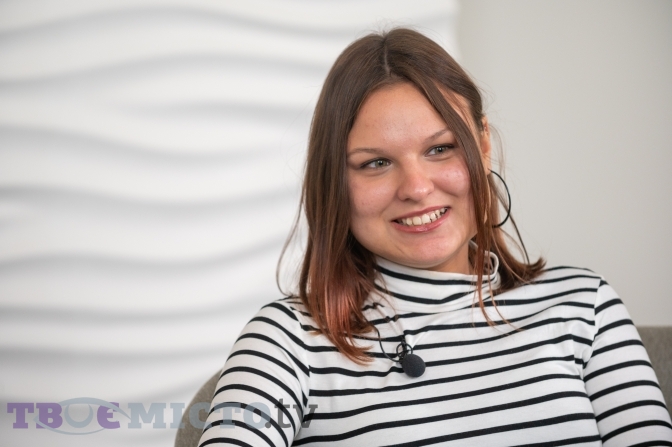
Do we have directors who are really known in the West, in the USA? Because if our theatres carry Russian works, they will be secondary. «Mom on Skype» worked because everything here is authentic, Ukrainian: the book, the screenwriter, the performers. And if we went with a Russian performance, it would have a double meaning, they would not understand this…
Oleh Oneschak: I don’t know how the story with Olha Sumska ended [the actress was supposed to go on tour in Europe with the production of «The Master and Margarita» by the Russian director Valeriy Belyakovich, who died in 2016. He staged four productions of this work, the last one for the Moscow Art Theater in 2009. Now, this play is shown both in Russia and abroad – Ed.] Everyone was very protective of her, saying that the performance is good. But I’m in a different atmosphere now, and these excuses of theirs sound kind of wild.
Read also: «Why finance culture, when the war goes on?» Theatre life comes to living in Lviv
In 2018, Bohdan Polishchuk and I, as co-founders of the Gallery of Scenography, launched the Lviv Quadriennale of Scenography. The preview of this festival was called «Identification», because it was often talked about.
My friends and I are interested in who we are at the world level, where is the truly Ukrainian theatre, not the «a la» one. What is that ID? We need to work on it now and discuss it.
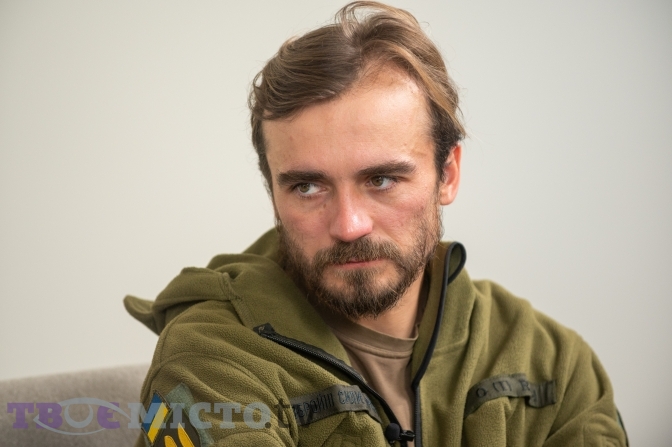
A new class of actors is recruited, but under what system will they be trained? Probably according to Stanislavskyi! There will be Chekhov again, and all that culture. No matter how we twist it, no matter how we say «no, no, it’s about Kharkiv», «this is the Chekhovian intelligentsia that is dying out». All this connects us with Russia by thin threads that you don’t seem to notice, but they are common.
In 2010 or 2011, I went to workshops in Wroclaw organised by the theatre guru Anatoliy Vasiliev. He is a Russian exile, at least considers himself like this, even though he is still an imperialist! At that time, Crimea hadn’t yet been annexed. But as soon as the topic of something Ukrainian came up, the Russians got bloodshot eyes and everything got confused in their heads. It’s not for nothing that it’s said that a «good Russian» ceases to be one very quickly when it comes to Ukrainian issue.
There were people from all over the world at the workshops, many of whom I am still friends with, some wrote after the war that they were ready to accept my family.
Russians were also there, and we had to come up with joint sketches. Do you know what we agreed on in five to ten minutes? – Because they and I watched the same cartoons, played the same games, and read the same books in school. Even then, I was amazed at how it was all connected. And this is still going on... But we do not engage in barbarism, we do not destroy, we do not burn books.
About plans and hopes
What are your plans? Are you working on something new?
Khrystyna Hniedko: To resume rehearsals and do something new with other members of the theatre studio – the guys who didn’t go with us to the USA. They are probably a little offended because of this.
Oleh Oneschak: We did not plan this on purpose. But the fact that the girls themselves went, with the exception of little Oleksiy [Oleh’s son], showed that the men are staying here, protecting Ukraine. This is the picture for the Americans: children and women went to collect for the plane, but the director did not come, because he is in the military service. And this makes society even more strange.
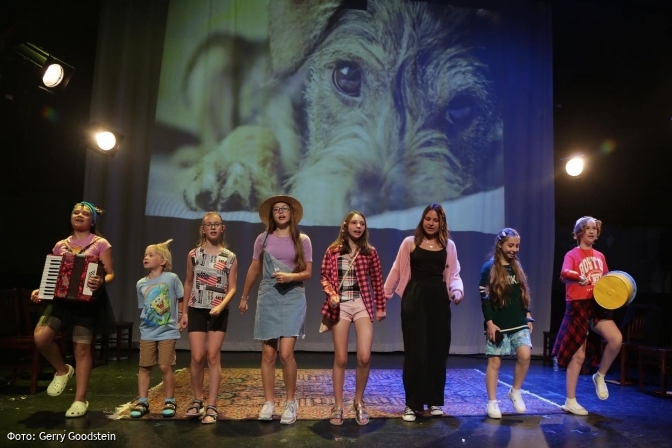
Marho Kuzma: Regarding the plans: while we were driving here, Mr Oleh asked what genre of play we wanted to stage. We with boys agreed on prose and comedies.
Oleh Oneschak: Rehearsals will currently depend on my service, the situation at the front and how long I will be in Lviv. But, I think that you can take something comedic. Maybe some jokes that people say in the bomb shelter.
What if you, girls, were told to play Chekhov?
Khrystyna Hniedko: No! I would easily give up Chekhov, believe me. But Mr Oleh won’t tell us that.
Oleh Oneschak: They understand it. I work at the «School of the Free and Not Indifferent» as the head of the theatre department. It is in our program, even though it’s an academic school where there are regular classes.
We are preparing a book for children in which Les Kurbas will tell the story of the theatre as a character. We are looking for what he said for her in order to tell children more about the theatre in a more accessible way.
Read also: We want to survive, not starve to death, and preserve the museum exhibits

The theatre group is visiting the head of the Lviv Regional Military Administration Maksym Kozytskyi
I believe that if Kurbas had not been shot, we would have had our own Ukrainian theatre with our own system, because he worked very systematically. In Kyiv, the Lavra has a museum of theatre and cinema founded by Kurbas [Museum of Theater, Music and Cinema of Ukraine at 9 Lavrska Street] I didn’t know about it until last year. He and Meller made performances, built a museum, Kurbas took his directorial course, trained actors, built his system, arguing that we must move away from Russian as much as possible, move towards Europe. We have to find ourselves: who are we, can we compete at the world theatrical level? I think we can, because if you create something of your own, it’s interesting.
As your experience has shown, we can. You just have not to be afraid to show yours.
Oleh Oneschak: Recently, I read an article by the Ukrainian director Vlad Troitskyi, who writes that in Europe you can’t be silent about Ukraine for a minute, because this topic is already a little off. I agree with him one hundred per cent.
It was surprising to hear the following in the summer during communication with the diaspora: «It’s good that the children are going on tour, maybe the situation will be perceived differently. Because some Americans are surprised, they think that the war has already ended.» The Ukrainian topic subsides, people think about their own problems, for example, the fact that the price of gasoline has risen.
Sergiy Smirnov spoke, translated by Vitalii Holich
Text: Olha Katsan, Marichka Ilyina
Photo: Ivan Stanislavskyi,
Dear Black, Gerry Goodstein
Collage: Dmytro Taradayka
Full or partial republication of the text without the written consent of the editors is prohibited and considered a violation of copyright.
Follow us on Facebook and Instagram. Lviv Now is an English-language website for Lviv, Ukraine’s «tech-friendly cultural hub.» It is produced by Tvoe Misto («Your City») media-hub, which also hosts regular problem-solving public forums to benefit the city and its people.












